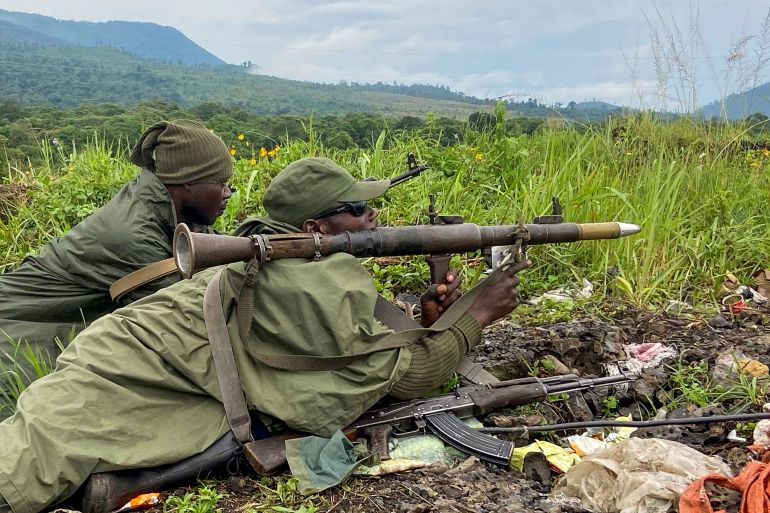DRC accuses Rwanda of sending disguised soldiers across border
Kigali dismisses accusations as fake as tensions between the two nations escalate over resurgent violence in DRC’s east.

The armed forces of the Democratic Republic of the Congo (DRC) have accused Rwanda of sending special forces in disguise into the country’s territory, marking the latest flashpoint in an escalating dispute between the two neighbours over resurgent violence in its east.
DRC’s military alleged that 500 Rwandan soldiers had been deployed in the Tshanzu area in North Kivu province, which borders Rwanda, in a statement issued on Thursday.
Keep reading
list of 4 itemsAnalysis: Why are Rwanda and DRC having another diplomatic spat?
Anti-Rwanda protest in DR Congo over alleged rebel ‘backing’
UN: Latest DRC violence has displaced more than 72,000 people
It said the soldiers were wearing a green-black uniform different from the regular Rwandan apparel. The statement also called on the local population to exercise caution as well as denounce anyone seen in such clothing.
It added that M23 rebels, allegedly backed by Kigali, had attacked a group of United Nations peacekeeping forces in the Rutshuru area, also in North Kivu, injuring three Tanzanian peacekeepers.
The Reuters news agency quoted a spokesman for Rwanda’s army as saying the claims were false. Meanwhile, a government spokeswoman told Reuters that Kigali would not respond to baseless accusations.
Souring relations
Kinshasa has accused Kigali of actively supporting the M23 rebel group, which in recent weeks has been waging its most sustained offensive in eastern DRC since capturing vast swaths of territory there in 2012-13.
“Today, it’s clear, there is no doubt, Rwanda has supported the M23 to come and attack the DRC”, President Felix Tshisekedi said on Sunday on state television.
The M23 is the latest in a series of ethnic Tutsi-led rebel groups to rise up against DRC forces, claiming to defend Tutsi interests against ethnic Hutu armed groups.
Rwanda has denied this and in turn accused DRC’s army of firing into its own territory and of fighting alongside the Democratic Forces for the Liberation of Rwanda (FDLR), an armed group run by ethnic Hutus who fled Rwanda and are alleged to have been involved in the country’s 1994 genocide.
The simmering dispute has caused relations between the two states to sour. At the end of May, hundreds of Congolese attended an anti-Rwanda protest in Kinshasa.
Meanwhile, the latest fighting in eastern DRC has forced tens of thousands to flee their homes in a region that has had little respite from war since Rwanda and Uganda invaded in 1996, citing threats from local rebel groups.